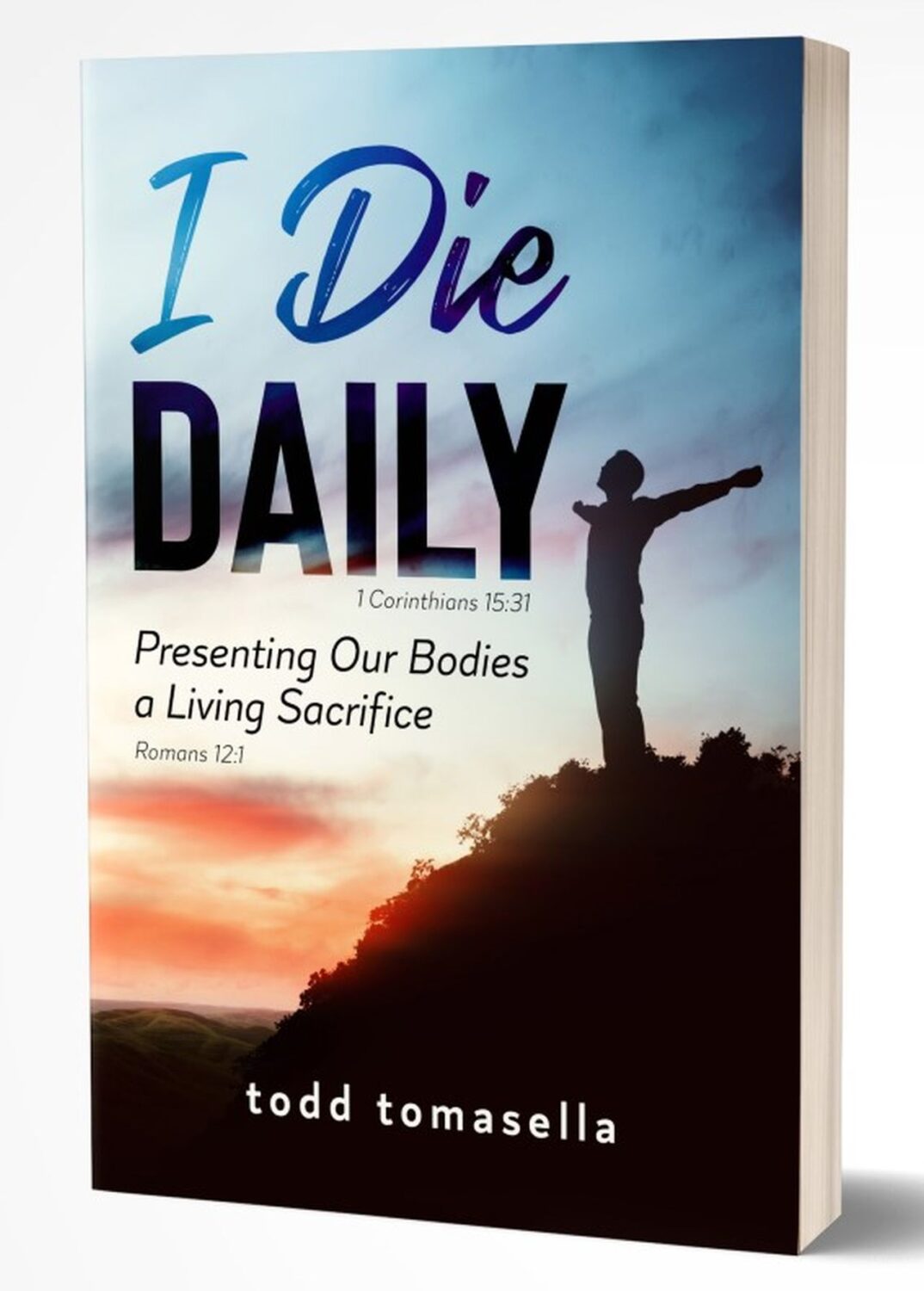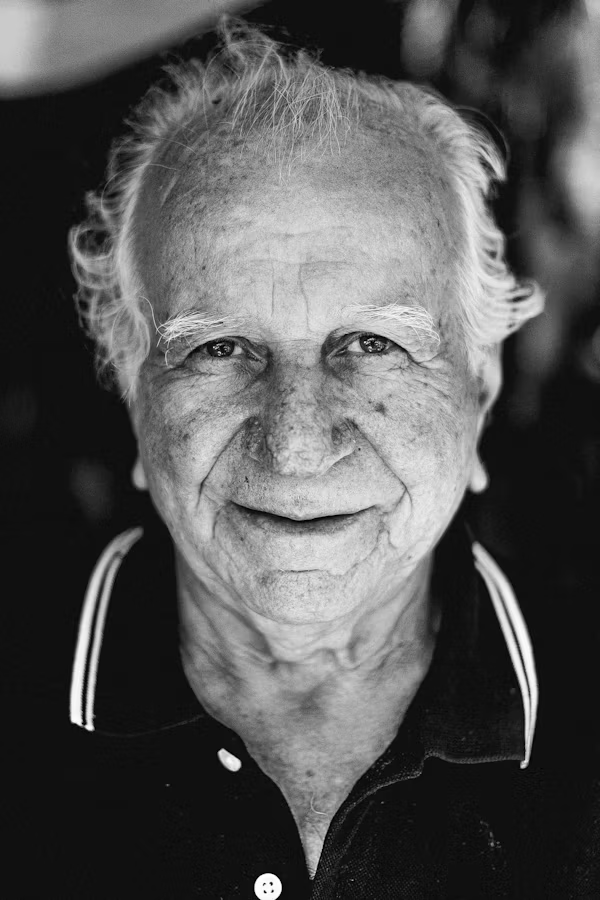Excerpt from the book I Die Daily
“But God forbid that I should glory, save in the cross of our Lord Jesus Christ, by whom the world is crucified unto me, and I unto the world.” Galatians 6:14
“The cross” is all about relationship. “The blood of His cross” purchased us back to God from sin (Acts 20:28; Col. 1:20). Paul here says in essence that His love for the Savior, who bled for his sins, warranted his full allegiance to Him and crucifixion with Him. Nothing was more important to this servant apostle than knowing Christ and remaining in Him (1 Cor. 9:27; Phil. 3:7-10). All else was counted as “dung” compared to the supreme and surpassing importance of his relationship with Jesus Christ. This is the “mark” the apostle pressed “toward” with all of his being (Phil. 3:7-14). Paul knew the eternal danger of not keeping under the sins of his body and in the end becoming a “castaway.” (1 Cor. 9:27) He was fully aware of the five specific sins that kept God’s own people out of their promised land, and would keep him out of the promised land of Heaven if he allowed his sinful nature, which was at “enmity against God,” to rule in his life, bringing defilement in the eyes of a holy God (Mk. 7:20-23; Rom. 8:7; 1 Cor. 9:27-10:12; Heb. 12:14-16). God’s stated will is to bring people “out from” spiritual death and “in” to the place of His divine life, that He might preserve them alive (with His life—Deut. 6:23-24; Rom. 8:1-13).
The purpose and point of “the cross” is not that God is trying to deprive anyone of something valuable, but rather that He seeks relationship with that person—“for our good always.” (Deut. 6:23-24) It is by the blood of Christ’s cross that we are saved, and “through faith” in Him that we are “kept.” (1 Pet. 1:5) Those in Him must “endure to the end.” (Matt. 10:22; 24:13)
It is “the goodness of God leadeth thee to repentance.” (Rom. 2:4) From the beginning, He made us for relationship with Him (Exod. 25:8). This is why Jesus came to the earth—“And this is life eternal (the reason for it), that they might know thee the only true God, and Jesus Christ, whom thou hast sent.” (John 17:3)
Since the LORD is holy, and the self-life or nature is sinful and at enmity with Him, it must be put to death because He who is “Holy, holy, holy” will not commune with a sinful vessel (Isa. 6:3; 59:2; 2 Cor. 6:14 -7:1; 1 Jn. 1:3-9; Rev. 4:8). Sin breaks that fellowship (Rom. 6:23). Like it or not, “the wages of sin is” still spiritual “death” and always will be, due to God’s eternal and unchangeable nature of holiness. The cross of Christ is the answer.
Holiness or pureness of heart and thought is of supreme importance in the eyes of the Almighty. His eyes are upon our hearts and the thoughts that we are dwelling upon (1 Sam. 16:7; Ps. 51:10; 139:23-24; Prov. 15:3; Matt. 5:8; Acts 15:9). The cross, which must be daily applied to the inner life by the disciple, is the implement of death to the sinfully self-loving, self-driven, self-willed, and self -consumed life. The fervent worship of Jesus, which always leads one to the application of the cross, brings the glorious liberty that only Christ can grant—to be fully filled, led, and made free by the Holy Ghost of God.
One manifests his love in relationship with the LORD when he chooses to obey Him in denying the iniquitous deeds of the sinful nature, in order that he might commune with and serve the Father and Savior, who died on the cross to reconcile him to the One who is “Holy, holy, holy.” (Isa. 6:3; 1 John 1:3-10; Rev. 4:8) Otherwise, sin will prevent his relationship with the LORD. Sin must be confessed to be cleansed (1 John 1:9). Saving faith will always drive one to obey Christ, which includes the premium He places on His people being “pure in heart.” (Matt. 5:8; 1 John 2:3-5; James 1:22) Christ told us that only the “pure in heart” will be blessed.” (Matt. 5:8) If one who has been saved goes back and ceases to obey Christ, it’s because he no longer loves Christ supremely, nor does he now possess saving faith (1 Tim. 5:12; 2 Tim. 4:10; James 2; 2 Pet. 2:20-21).
If a person does not want more of Jesus, he is not a part of the remnant of Christ’s elect (Rev. 17:14). If a person is always looking to circumvent the “daily” cross, and looking for doctrinal ways to justify not giving over his whole will and being to Christ, he is willingly lost (Rom. 12:1). Those who are truly His “depart from iniquity,” as they daily “present” their “bodies a living sacrifice, holy and acceptable unto God.” (Rom. 12:1; 2 Tim. 2:19)
If one will guard his heart and be preserved to the end in his relationship with Christ, he must beware of the numerous cross-less and Calvinistic wolves who occupy positions of leadership and influence in the modern church world. Millions have already been deceived and will be shocked on Judgment Day (Matt. 7:15-23; Luke 13:27-28).
The LORD bless you richly today, and fill you with His Holy Ghost afresh to subdue your own self-life, that Jesus’ life might be manifested in your life (2 Cor. 4:10-12). God is able as we do things His way. His grace is fully sufficient for us (Rom. 6:14; 1 Cor. 15:10; 2 Cor. 12:9-10).
In God’s economy, holiness in His people is a must, and it’s the blood of Christ that enables the recipient and possessor of His salvation to experience overcoming victory through the cross (Rom. 6; Heb. 12:14; 1 Pet. 1:15-16; Rev. 21:8, 27). His enabling grace was made possible through Christ’s redemption, and there is therefore no excuse for living in sin (Rom. 6). There can be no variance from such biblical truth in true Christian preaching. Sin separates and hell awaits all who die in sin—no matter what their previous relationship with God may have been (Rev. 21:8, 27; 22:11, 15). Relationship with Christ, personal holiness, the cross, overcoming sin, and repentance, go hand in hand; and today, none of these essentials can be found prevalent in the mouths of most so-called “Christian” pastors, writers, and leaders (Isa. 9:16; 1 Cor. 1:18; Phil. 3:18-19). By “the blood of his cross,” Christ made us holy in our position with God, and He commands each of us to take up our own cross and count ourselves crucified with Him in our daily lives, that His holiness might be manifest experientially in our lives (Rom. 6; 2 Cor. 4:10-11; Gal. 2:20).
David Kupelian, vice president and managing editor of WorldNetDaily.com, writes:
“‘I die daily’
In ages past, Christians dwelt a lot more on the concept of taking up the ‘cross’ than they do these days. Today, the phrase ‘it’s my cross to bear’ is usually a somewhat self-congratulatory reference to the fact that we have to put up with a vexing medical condition, or a child in trouble with the law, or perhaps an overbearing, live-in mother-in law.
Admonitions from the pulpit may not shed much more light. Oh sure, a well-intentioned minister will reverently read one of the scriptures cited above on ‘taking up the cross,’ and he might even briefly plug the ideal of self-denial. But too often this amounts to a polite nod to a notion that seems both archaic and almost irrelevant, or at least unattainable, and the pastor just moves on to more pleasant topics—like how grateful we are that we’re saved by Christ’s death and resurrection.
It wasn’t always so. Throughout past centuries, Christian philosophers and mystics dwelt at length on the crucial, life-and-death need for repentance, resignation, ‘mortification,’ the ‘crucifixion’ of sin in man, and the ‘death of the carnal man’ or of ‘the creaturely self’ and so on. The Apostle Paul said it most powerfully and succinctly when he wrote: ‘I die daily.’”
If they are not crucified on the cross we are instructed to “take up,” the deeds of the body will cause one to displease the LORD by the manifestation of the soul damning “works of the flesh.” (Gal. 5:19-21)
There is perhaps room to see Paul’s words “I die daily” both concerning our lives being laid down and subject to being martyred daily and also in dying daily to self that the Savior might reign (John 12:14; 2 Cor. 4:10-12). These two truths seem to dovetail together; Being dead to self is going to be essential to dying as a martyr.
The Two Cross Deaths
There are two kinds of dying seen in the Scriptures—positional and experiential.
Positional death speaks of our oneness with the death Christ experienced when He died on the cross, when he did “taste death for every man.” (Heb. 2:9) Positionally we are dead and buried with Him (Rom. 6:3-4).
Experiential death of the inner self-life = the willing crucifixion of the personal will out of a far surpassing love for and desire to see Christ reign supreme. When we love Him more than ourselves, we will die so He can live. Life can only spring out of death (Jn. 12:24). The problem is that most people who claim to be Christians love themselves more than Christ (2 Tim. 3:1-7). They have freely chosen to resist loving the LORD with all of their hearts, souls, minds, and strength (Matt. 22:37-40).
The Positional Cross
The word “baptized” is used in more than one way in the Bible. It is used to express both a literal and a figurative immersion. Immersion simply means being placed all the way into. In Romans 6, speaking figuratively of our baptism into Christ (not water), the apostle writes:
“Know ye not, that so many of us as were baptized into Jesus Christ were baptized into his death? Therefore we are buried with him by baptism into death: that like as Christ was raised up from the dead by the glory of the Father, even so we also should walk in newness of life.” Romans 6:3-4
We have been immersed (baptized) completely into Christ figuratively—“we are buried with him by baptism into death.”
Our justification and sanctification are wrapped up in being buried with Christ. We are then raised with Him and enabled to “walk in newness of life.” Our position—buried with and in Christ—enables the literally manifested life of Christ to be experienced in our daily lives.
We are united with Christ in His death, burial, and resurrection. The phrase “in Christ,” seen throughout New Testament Scripture, is short for our immersion into Him—His death, burial, and resurrection and our own death, burial, and resurrection with Him. Jesus died and was raised up once, and we died and are raised up with Him in type/proxy.
“Even when we were dead in sins, hath quickened us (made us alive) together with Christ, (by grace ye are saved;) And hath raised us up together, and made us sit together in heavenly places in Christ Jesus: That in the ages to come he might shew the exceeding riches of his grace in his kindness toward us through Christ Jesus.” Ephesians 2:5-7
THE LORD has “raised up” those He has found and saved out of their sinful state and into His eternal kingdom. They are “raised up” to “sit together” with Him—“in heavenly places in Christ Jesus.” This He did for His eternal purposes. He “made us sit together in heavenly places in Christ Jesus,” so this is our positional standing with Him; yet His desire is that such a positional place become an experiential reality in our “daily” lives, as we “follow” Him. And how does such a translation happen? This manifested “newness of life” occurs as we lay down our self-will in full surrender to His Majesty, crying out “Father, into thy hands I commend my spirit.” (Luke 23:46) Victorious living in this “newness of life” happens when we follow His instructions to “deny” ourselves and “take up” the cross, and let His will and life reign in our mortal bodies in place of our own. This positional seating in Christ and with God in heavenly places becomes a reality in our daily experience as we sentence our lives to death, being rooted in Christ, as we “take root downward.” (Isa 37:31) He then raises us upward in “newness of life”—with His life to bear fruit to His pleasing.
Our positional place with Him means that we died with Him, and we are seated in heavenly places in Christ. Yet, we are still on earth and subject to temptations. This is why the experiential cross is so important.
The Experiential Cross
“For if we have been planted together in the likeness of his death, we shall be also in the likeness of his resurrection: Knowing this, that our old man is crucified with him, that the body of sin might be destroyed, that henceforth we should not serve sin. For he that is dead is freed from sin.” Romans 6:5-6
The believer, who is buried with Christ and raised in “newness of life,” is told that he “should not serve sin.” Serving sin or the Savior is always going to be a choice as long as we are on the earth.
“For sin shall not have dominion over you: for ye are not under the law, but under grace.” Romans 6:14
Paul told us that he had to keep under the sinful desires/deeds of his body so that he would not become a “castaway” from Christ in the end (1 Cor. 9:27). What can we learn from this? Our relationship with Christ is both positional and practical. It began in our past when we were born again, and exists now daily as we deny ourselves, pick up our cross, and follow Him. This is our personal participation with Christ as we take up the yoke and walk with our Master—His blessed Gospel—dying, being buried and then raised up daily with Him.
In studying the subject of dying daily and Paul’s words in 1 Corinthians 15:31, “I die daily,” I have read a few commentaries which seemed to only acknowledge the positional death of the believer. This is because the misguided Calvinist wants no part of anything that might cost him the suffering of death to his own will. He wants to believe that God did it all, and subsequently ignores the commandments of the very same God for him to personally experience dying to self and self-will. The Calvinist is a moral coward who wants the crown without the cross, so he objects to and flees any notion of personal responsibility. In the face of a mountain of Scriptural commands and conditional blessings, he insists that there are no requirements placed upon him. If that were so, why were we then given the many commandments of Christ and His holy apostles? The diabolical dynamic of Calvinism is to escape and deny by any means possible, any teaching that calls for a personal cost. In contrast, the Bible teaches us that to lose is to gain (Matt. 10:3839; Jn. 12:24-26; Phil. 1:21). The spiritual coward wants to hide away in his false security zone, where he is protected from all that would cause him to suffer—the circumcising sword of the Word, persecutions, tribulations, dying to sin and self, purging, and the chastening of the LORD. This is why this theology always migrates to the line of least resistance to the flesh—no baptism in the Holy Spirit or lordship of Christ, due to the myth of ‘once saved always saved,’ and a pre-tribulation rapture. (Actually, although he holds no strong position on the exact timing of Christ’s return, this writer believes that there is the possibility of a pre-tribulation rapture. In the previous statement, I was just making a point.)
Some may despise the idea that people teach the Scripture “I die daily” as something that needs to be done by the individual recipient of salvation. The Calvinistically infected mindset believes that everything that needs to be done has already been done, and that man has no choice or accountability in the matter of participation. It’s true that Christ initiated and earned our salvation, and that without Him we are hopeless. It is also just as true that this same Jesus instructed those who would follow Him to be “daily” crucified with Him, by denying themselves and taking up their crosses. Romans 6 says “Our old man is crucified with him” (v 6), and yet it also says:
- “What shall we say then? Shall we continue in sin, that grace may abound?” (v 1)—The question “Shall we” denotes volition, option, and choice.
- “For if we have been planted together in the likeness of his death, we shall be also in the likeness of his resurrection.” (v 5)—The “if” here speaks of volition, option, and choice.
- “Reckon ye also yourselves to be dead indeed unto sin, but alive unto God through Jesus Christ our Lord.” (v 11)
- “Let not sin therefore reign in your mortal body, that ye should obey it in the lusts thereof.” (v 12)
- “Neither yield ye your members as instruments of unrighteousness unto sin: but yield yourselves unto God, as those that are alive from the dead, and your members as instruments of righteousness unto God.” (v 13)
- “Know ye not, that to whom ye yield yourselves servants to obey, his servants ye are to whom ye obey; whether of sin unto death, or of obedience unto righteousness?” (v 16)
The honest student of the Bible, the one that refuses to allow himself to be infected with any predisposed notion, will see this.
The work of Christ to position us in heavenly places is a settled fact and truth (Eph. 2:6). As we are discovering from Holy Writ, the experiential cross of the individual must be taken up and died upon. Paul the apostle of Christ said, “I KEEP under my body.” (1 Cor. 9:27) The denial of the self-life and following Jesus is only accomplished by the enabling grace and Holy Spirit of the LORD, who is perfecting that which concerns us as He continues His good work in us—we who have been apprehended by Him for His purpose and glory (Ps. 138:8; Phil. 1:6; 2:12-13). This occurs as we “work out” our “salvation with fear and trembling.” (Phil. 2:1213) It is “through the Spirit” that we are blessed and empowered to “mortify the deeds of the body.” (Rom. 8:13)
There are those who know only the positional application of the cross, where we “are dead” and buried with Christ, and raised up by the faith of the operation of
God, and seated together in heavenly places in Christ (Rom. 6:3-4; Eph. 2:6; Col. 3:3). In spite of understanding that we are dead, buried, and raised up with Christ, men misunderstand or do not know about the doctrine of the daily cross—the keeping under or subduing of the sinful nature on a daily basis. The essential nature of such a biblical and vital truth is tragically seldom, if ever, spoken about in most “ministry” that transpires in the modern church world.
Love is a daily test.
Love is a daily choice.
That person who has a mere “form of godliness” and yet denies the power of Christ to reign in his life, will never experience the fellowship of His sufferings and the blessed “fruit” He desires to bring forth “upward” to His glory (Isa. 37:31; Rom. 8:11; 2 Tim. 3:5). Many seek to render rote adherence to the command of Christ while lacking the positional revelation of the death, burial, and resurrection of the Gospel. In contrast, the true disciple of Christ is that one who is driven by the greater desire and love that possesses his heart for Christ. His love for Jesus far surpasses his love for self and the pleasures of this world.
Throughout Holy Scripture, we are afforded the blessing of witnessing the joyful delight many had for the LORD. Here is a sampling:
“Whom have I in heaven but thee? and there is none upon earth that I desire beside thee.” Psalms 73:25
“That I may know him, and the power of his resurrection, and the fellowship of his sufferings, being made conformable unto his death … Brethren, I count not myself to have apprehended: but this one thing I do, forgetting those things which are behind, and reaching forth unto those things which are before, I press toward the mark for the prize of the high calling of God in Christ Jesus.” Philippians 3:10, 13-14
“One thing have I desired of the LORD, that will I seek after; that I may dwell in the house of the LORD all the days of my life, to behold the beauty of the LORD, and to enquire in his temple.” Psalms 27:4
The “one thing” that most deeply and profoundly moved these men and women was knowing Him more and more, seeking His face in earnest as they experienced Him daily.
“Behold, what manner of love the Father hath bestowed upon us, that we should be called the sons of God: therefore the world knoweth us not, because it knew him not.” 1 John 3:1
The love we are blessed to possess of Him, and the cross, go hand in hand. Because of His love in us, and our own decision to reciprocate that love, we make a daily choice to experience the cross. The daily cross is the application of death applied into our life and will in order that Christ’s will and life might be in control and reign in our mortal bodies (2 Cor. 4:10-12).
God made man with a choice (Deut. 30:19; Josh. 24:15; Gal. 6:7-9). Firstly, it makes no sense at all biblically speaking, to say that the person and volitional will of the individual believer plays no part in his decisions. That is a diabolical and Calvinistic heresy that has no biblical ground beneath it. Those in denial of the cross Jesus commanded us to “daily” take up, simply do not wish to deny self and sin as Christ commanded. Many of them have placed the teachings of mere men—who were heretics—above God’s Word. Instead of setting aside the “doctrines of men” for Christ’s teachings, they set the teachings of the Son of God aside for the teachings of mere men (like John Calvin). Like the Pharisees of Christ’s day, these men love their traditions more than the LORD and His Word (Mark 7:6-9). Every generation in history has its pseudo-theologians, who cast away the Word of God for their own traditions of mere men. Every day also has a remnant, which says, “Let God be true and every man a liar.” (Rom. 3:4)
Letting “God be true” in our personal lives includes silencing the call of the sinful nature, Satan, and the voices of the myriad of cross-denying wolves, who come in Christ’s name yet do not preach His original Gospel.
“And he said to them all, If any man will come after me, let him deny himself, and take up his cross daily, and follow me.” Luke 9:23
Throughout His teachings, the Son of God taught us that following Him was a “daily” experience and not a onetime event. He made it abundantly clear that this “daily” experience of His life was only possible in conjunction with the disciple’s self-denial, and his choosing to prefer the Savior above himself (Matt. 16:24-26; Luke 9:23-24; John 12:23-26).
“Many admit the positional death (at initial salvation), but there is also a present salvation (progressive sanctification or transformation) that is experiential, the daily death, burial and resurrection. The Leviticus 1 burnt offering occurred daily. The first thing the invader always did at the Temple was to do away with the daily sacrifice. This will also be 1st order of business for the antichrist, and for those who possess the spirit of antichrist today.”
Christ told us that if we would follow Him, we must “daily” take up the cross and follow (Luke. 9:23-24). As one writer has pointed out here, the daily sacrifice is attacked by the invader and enemy of our souls, and this is seen in the absence of such preaching in that which calls itself the church today. The Bible tells us that “Satan” has his “ministers,” and these men are “deceitful workers” who have infiltrated the modern church and so-called higher learning institutions (seminaries, etc.). See 2 Cor. 11:12-15. These “false apostles,” who are imposters, have hi-jacked the pulpits and publishing houses of this last hour with a message that is void of the cross and is sending many to eternal darkness (2 Pet. 2:1-3). They can be identified as the “enemies of the cross of Christ,” who do not take up their own crosses daily, and therefore do not preach the cross as a daily implement of death to self and self denial (2 Cor. 11:12-15; Phil. 3:18-19). Instead, they “mind earthly things,” even using Scripture to justify their misplaced affections (Phil. 3:18-19).
The “adversary, the devil,” can “devour” us by drawing and seducing us out from our daily and experiential death and burial with Christ, where we are “hid with Christ in God.” (Col. 3:3) When the enemy is able to draw one out into the open, he is then vulnerable as a deer that comes out of the forest and is no longer hidden and protected by the camouflage of the trees. When a deer is out in the open and in a prairie clearing, he is then prey for predators. The lions can then see and smell him, and will seek to devour him.
Taking up the daily cross and experiencing knowing Him in “the fellowship of his sufferings” demonstrates our agreement with God that we are utterly depraved in our Adamic nature, and wholly in need of His righteousness and life to reign in our “mortal” bodies (Rom. 6; 2 Cor. 4:10-11; Phil. 3:10).
In this following passage, watch for the daily experiential cross to be practiced by every true disciple of Jesus:
“Always (daily) bearing about in the body the dying of the Lord Jesus, that the life also of Jesus might be made manifest (a reality) in our body. For we which live are alway (daily) delivered unto death for Jesus’ sake, that the life also of Jesus might be made manifest in our mortal flesh.” 2 Corinthians 4:10-11
As we related earlier in this chapter, the removal of the “daily” cross is the work of our “adversary.” The same vulnerability (removal of the daily cross) exists today wherever the redeemed saint allows for the “daily” sacrifice to be stolen from his life. The daily presenting of ourselves to Him as “a living sacrifice” is our “reasonable service” in light of what He has done for us (Rom. 12:1).
Because He loves us as His own, Christ instructs those He saves to “daily” deny themselves and take up their crosses to follow Him (Luke. 9:23-24). It is only in being
“dead” to sin and self that our lives “are hid with Christ in God.”
“For ye are dead, and your life is hid with Christ in God.” Colossians 3:3
“Precious Things” Stolen
“There is a conspiracy of her prophets (leaders)in the midst thereof, like a roaring lion ravening the prey; they have devoured souls; they have taken the treasure and precious things; they have made her many widows in the midst thereof.” Ezekiel 22:25
Ezekiel the prophet of God is writing here concerning the leaders of the very nation of Israel. This “conspiracy” he speaks of is a reality and not a theory. We have the divine word on it here. The Bible tells us definitively here that “There is a conspiracy of her prophets” or leaders who claim to be representing the LORD. We are also informed here that these beguilers “have taken the treasure and precious things.” They have stolen away those things which are most important for believers to be aware of, believe, dwell upon, and do.
The enemy invader is now empowering his agents in the pulpits and those who hold the pens of modern publishing. This is seen in the deafening silence of the modern messages we hear. There is a gross lack of hearing the essential truths of Holy Writ spoken or written by men who have positions of influence. In fact, in fulfillment of last day’s prophecy, hoards of self-serving people (who claim to be Christians) are heaping these smooth and deceitful messages, and the messengers who give them, to themselves. Their un-crucified sinful nature seeks out ear-tickling messages that feed their sinful nature instead of beckoning them to crucify it (Rom. 6; 12:1).
In his messages, the beguiling leader feeds the sinful nature, while the leader who is a true servant of Christ calls for the denial of and death of it (Rom. 16:17-18; Phil. 3:1-3; 18-21; 2 Pet. 2:1-3).
Many who love the truth, and therefore deeply desire more of Christ, are coming out of the cross-less and apostate modern church system. Like Paul, their deep desire is “to know him, and the power of his resurrection, and the fellowship of his sufferings, being made conformable unto his death.” (Phil. 3:10) They have seen the folly and the “famine in the land, not a famine of bread, nor a thirst for water, but of hearing the words of the LORD.” (Amos 8:11)
Where We Stand
In a passage often referred to as defining the true Gospel, the apostle Paul reveals that this “gospel” is that “wherein ye stand.”
“Moreover, brethren, I declare unto you the gospel which I preached unto you, which also ye have received, and wherein ye stand.” 1 Corinthians 15:1-4
As those found and regenerated by Him who first loved us, we “stand” in the Gospel of Christ—both positionally and experientially. In fact, the very next words speak to the essential responsibility of personal participation of the individual recipient of His “so great salvation.” (Heb. 2:3)
“By which also ye are saved, IF ye keep in memory what I preached unto you, unless ye have believed in vain.” 1 Corinthians 15:2
The “if” here clearly denotes condition. Our salvation is contingent upon “if” we “keep in memory” the original “gospel” the apostle Paul preached, “unless ye have believed in vain.” Our initial salvation becomes ineffectual if we do not “continue” in Christ or “endure to the end.” (Matt. 10:22; Col. 1:23; Heb. 3:6, 12-15; 10:26-39; 2 Pet. 2:20-21)
Daily experiencing death to self and the raised up life of Christ, is essential to keeping in memory the work of Christ, the coming King.
See if you can identify both the positional and the experiential standing of the believer in this Colossians 3 passage:
“If ye then be risen with Christ, seek those things which are above, where Christ sitteth on the right hand of God. Set your affection on things above, not on things on the earth. For ye are dead, and your life is hid with Christ in God.” Colossians 3:1-3
He has accomplished salvation for us and we are thereby “risen with Christ,” positionally. In light of this, we should then follow suit in seeking “those things which are above, where Christ sitteth on the right hand of God.” This includes setting our “affection(s) on things above, not on things on the earth.” Positionally, we are to count ourselves “dead,” and consider that our lives are “hid with Christ in God.”
Some erroneously teach that the believer’s positional place with Christ is irreversible, but the Bible tells us differently in a myriad of places. Only when we keep our place or position “with Christ” are we “hid with Christ in God.” Otherwise we are not hidden away from the wrath of God and the enemy. Such a place of being “hid with Christ in God” is conditional upon the recipient of His salvation remaining in Him. One’s place with God is reversible if one does not “abide” or remain “in Christ.” Jesus told us that “If a man abide (remain) not in me, he is cast forth as a branch, and is withered; and men gather them, and cast them into the fire, and they are burned.” (Jn. 15:6) Our LORD also told us that there are those “which for a while believe, and in time of temptation fall away.” (Luke. 8:13) It should be more than obvious that someone could not possibly “fall away” from something he has not previously possessed. Also, the basic fact that Jesus invented the term “fall away” plainly reveals that such is possible.
That positional standing He purchased for us is ours only as we remain “with Christ,” and “if” a redeemed person chooses to cease following Christ, he is no longer “in Christ” or “with Christ,” and is therefore no longer the recipient of any of His blessings. The Father told us on several occasions that it is only in His only begotten Son that He is “well pleased,” so anyone presently outside of Him is not pleasing to God (Matt. 3:17).
The sacrifice of Christ is a fixed reality. He is invariable and unchanging (Mal. 3:6; Jn. 19:30; James 1:17). But the experiencing of the cross of Christ in the daily life of the recipient of His salvation is volitional. One must count all else “dung” compared to knowing Christ, and in order to “know him,” one must be willing to experience “the fellowship of his sufferings, being made conformable unto his death.” (Phil. 3:7-10).
All of Holy Scripture testifies to the truth that God’s blessings to individuals are conditional (Deut. 11:26-28; 28:1-67; 30:19-20). The fulfillment of His promises and blessings are contingent upon the obedience of the individual (Gal. 6:7-9; Heb. 6:11-12). The recipient of His free gift of eternal life must by faith “abide” or remain in Him, or he will be “cut off.” (Ezek. 33:12-13; Matt.
10:22; Luke 8:13; Rom. 11:19-22; 1 Cor. 15:2; Col. 1:23; Heb. 3:6, 12-15; 10:26-39; 2 Jn. 9; Rev. 2-3) This important subject is covered extensively in the book titled Lie of the Ages, which can be ordered on this site.
“Many of His Disciples Went Back”
In the record of John 6, we read of “disciples” who continued not with Christ after He taught them. They chose not to partake in His death and life. They did not want to suffer for His sake, and therefore “many of his disciples went back, and walked no more with him.”
“From that time many of his disciples went back, and walked no more with him.” John 6:66
These people forfeited their place with Christ and all the associated benefits, both here and eternally (Ezek. 33:12 -13). Suffering is part of following Christ, and those who “draw back,” not esteeming Christ and being unwilling to suffer for His sake, will lose out (Rom. 8:17; Phil. 1:29; Heb. 10:38-39; 1 Pet. 4:1-14; Rev. 2-3).
According to God’s Word, those who refuse to follow up in their daily lives with experiential living with Christ, partaking of His blessed sufferings and the associated benefits, will lose out on their positional place they once had with Him (2 Pet. 2:20-21). Those who after being bought by His blood, “deny him,” will also be denied by Him for having “trodden under foot the Son of God.” (2 Tim. 2:12; Heb. 10:29)
One will not experience His resurrection life if he refuses to experience a dying with Him—to self, sin, Satan, and this world.
Many today are seeking to gain, but they are trying to go around the cross. These people do not yet realize that it’s only in dying to self that God’s “gain” will come to them. It’s only in dying that they can live by the resurrecting power of God in Christ, who is “the resurrection and the life.” (Jn. 11:25) He promised to raise up by the power of His Holy Spirit those that be bowed down in death to self and sin (Ps. 145:15; Rom. 8:11). The LORD promises to raise upward in fruitfulness those that “take root downward.” (Isa. 37:31)
The cross is the place of safety—being in the center of God’s will. We are safe on the cross, buried, sunk down, and hidden in Christ while being “raised up” by His power and to His glory (Rom. 6:3-4; 8:11; Col. 2:11-12; 3:3). Beware of the wiles of Satan, who seeks to lure us off the cross where we are “hid with Christ in God.” (Col. 3:3) The enemy’s design is to keep you ignorant of the necessity of the cross—to keep you from experiencing Christ’s resurrection power. When you do choose to learn of Christ to get on the cross, the enemy’s scheme will be to get you to come down from that cross—to keep you from dying that Christ’s life might reign in you and over the enemy (Luke 10:18). Is this not what he did to our LORD? (Matt. 27:42)
The only way to have upward mobility—divine resurrection power—is to plant yourself deep into the death of Christ. The further down one descends, the more powerful the raising up will be (2 Cor. 4:10-12).
Jesus told us that we must lose our lives to gain His life and eternal life.
“Verily, verily, I say unto you, Except a corn of wheat fall into the ground and die, it abideth alone: but if it die, it bringeth forth much fruit. He that loveth his life shall lose it; and he that hateth his life in this world shall keep it unto life eternal.” John 12:24-25
PRAYER: Father, not my will but Thine be done. You must increase and I must decrease. I now this moment, choose to lay my life down—to die to self and all of its fleshly facets. I honor You, LORD Jesus and Father, and joyfully bow in humility before Your Majesty. Grant Your enabling grace to my life, so I might please You in all things. I am crucified with Christ. I am dead, and my life is hid with Christ in God. In Jesus’ Name, Amen.
Capture Points
- Discuss John 12:24-26 and what it means to “fall into the ground and die,” as pertains to Christ and also all of those who would follow Him.
- According to 1 Corinthians 15:1-4, what is “the gospel” that we stand in defined as? (KJV recommended)
- What did Jesus tell us was the purpose for which He came? John 17:3
100’s of Christ-centered, Scripture-rich podcasts for your edification in Christ.
Support | STORE | Podcasts | Jail/Prison Ministry | Mexico Mission here | All Ministry Updates | The Return of Christ | Stewardship | Apostate Modern Church Exposed | Beware of the BUZZ WORD Bandits [podcast] | Preach the Word | Wolves Exposed | 100’s of Christ-centered, Scripture-rich Podcasts | Knowing God | The Cross Life |

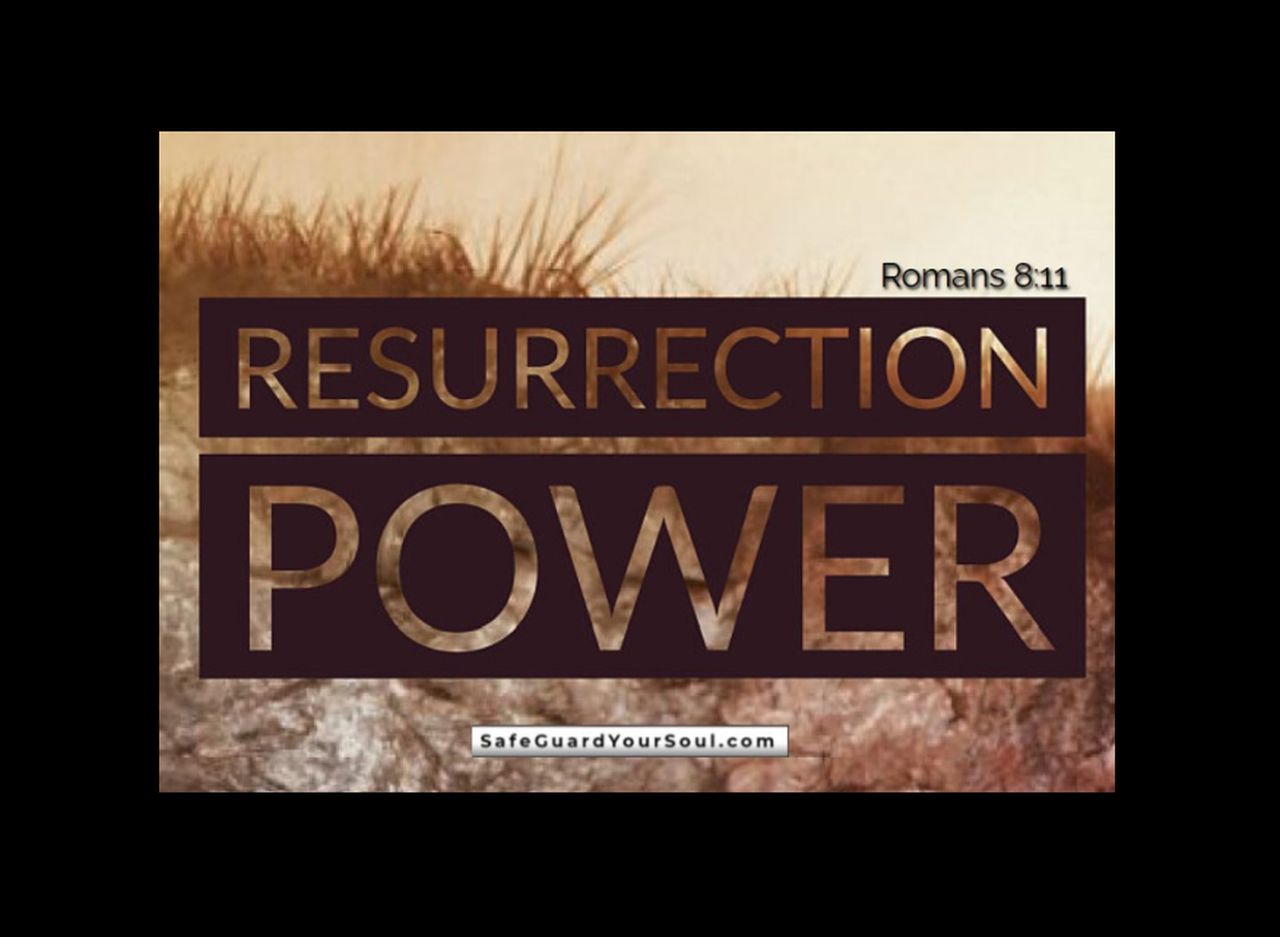

Articles
2 Marines on Mission in Mexico Depending on God’s Grace: Mission Mexico Part 33

UPDATE: Recently, you guys jumped in and ordered Bibles for sister Teri in FL. What a blessing!!!! As a result of your giving, 30 or more King James Bibles are on their way to Florida to bless the people in this kingdom outreach among English, Spanish, and bi-lingual people. We are blessed to minister the Word each weekend via technology. God is good. And you are supplying the saints to the glory of our King, Jesus.
WELL, last evening, again we ran out of tracts …. many being reached daily with our LORD’s bless-ed and glorious Gospel.
Manuel, father of 4 children, had lots of questions he was just waiting for the occasion to ask. God is working in this man’s life. He received ample portions of biblical truth. Oh and he accepted our invitation to pray for him before he left, and we did.
Your prayers are vital (Philippians 1:19; 2 Thessalonians 3:1).
Thank you for lifting Mission Mexico in prayer today – and most of all the beautiful people of Mexico who are super receptive of our LORD’s Gospel.
Now that there are 2 of us on the ground here, Mark and I, more JESUS tracts are and will be distributed – more souls reached for Christ our King. If anyone wishes to jump in and pay for the next batch of JESUS tracts in Spanish, feel free. Appr. $250. – Give Here. Takes Seconds. | Download. Read. Print out your supply of the JESUS tract – English and Spanish.
Jesus sends His disciples out two by two and so is the case with Mission Mexico (Luke 10:1). The market (mercado) was a field day this week, a target rich environment where many gladly receive the Gospel of Jesus Christ. And as usual, many stop everything they are doing to instantly open and read the JESUS tract. It’s stunning.
Though we “have no confidence in the flesh”, brother Mark is also a Marine veteran and on mission for King Jesus, something brother Mark has prayed to do for many years. So, by God’s grace and for His glory alone the work is at least somewhat approached with the “storm the beach” or “first in battle” mentality (ha). We glory is Christ alone! (Gal 6:14) Tempered with the grace of Christ and fruit of His Holy Ghost – fully dependent upon Christ (Galatians 5:22-23).
Our brother Mark is a “good soldier of Jesus Christ.” Please undertake to lift brother Mark in your daily prayer.
Mark was a 0311 grunt, a Marine scout and it shows in his strategic mapping and territorial tactics as he invades for Christ. Interestingly, a few years ago, the LORD impressed upon brother Mark’s heart that he would be ministering to the cartel. Stay tuned!
The following passages comes to mind:
“Thou therefore, my son, be strong in the grace that is in Christ Jesus. 2 And the things that thou hast heard of me among many witnesses, the same commit thou to faithful men, who shall be able to teach others also. 3 Thou therefore endure hardness, as a good soldier of Jesus Christ. 4 No man that warreth entangleth himself with the affairs of this life; that he may please him who hath chosen him to be a soldier. 5 And if a man also strive for masteries, yet is he not crowned, except he strive lawfully.” 2 Timothy 2:1-5
“WE are labourers TOGETHER with God” (1 Cor 3:9) and are now supporting a pastor in the Philippines who has been associated with the ministry for decades and is a faithful servant of the LORD. His name is Allan Abayon and I invite you to lift him in prayer. For now we are able to send him $100 month and welcome more support so this can be increased. God is able.
Chaplain Jay in south Texas (on the border) is in need of another shipment of the Authentic book in Spanish.
If I may add…. the prayerful goal is to have an additional $1,200 coming into the ministry monthly. For now I am personally supporting a portion of the ministry expenses and glad to do so. Yet it would be selfish to hog up more of the kingdom opportunity than is fair…..much more ministry opportunity is in need of attention. God is able and “God loveth a cheerful giver.” (2 Corinthians 9:7)
The ministry website feeds many worldwide daily, as well as the podcast which has now reached over 3.5 million downloads to date. Follow the SafeGuardYourSoul here. Feel free to share with others.
Pharmacists Desire and Receive God’s Word
WHILE waiting for Mark last night, I was passing out JESUS tracts and speaking God’s Word to several people at a prominent 3-way intersection. On that corner there is an established pharmacy. After joyfully ministering to a lost soul, I turned around toward that pharmacy only to be staring straight into the face of a smiling older gentleman who was holding out his hands, desiring to hear the Gospel and obtain a JESUS tract. He had seen others receiving and so asked to know about Jesus. His son was standing there next to him, smiling also. They asked to receive the Gospel and they did. While the son opened and was reading the JESUS tract, the older gentleman, the father, was instructed in Spanish to go home and repent and receive JESUS and when he did he would receive new life in Christ!!!!
The elder gentleman, the father, later told me he’s started and was operating that pharmacy for decades and was going to retire and his son would take over….. yet God had a plan to save him before it’s too late!!! Oh what love! John 3:16-17
God is good saints!
Jesus is coming.
Let’s roll!
“WE are labourers TOGETHER with God.” 1 Cor 3:9
UPDATE: I went back by this pharmacy to see this man and his son and was gladly received with a big hug and they took a stack of JESUS tracts to distribute at their pharmacy.
Benjamin: Here’s a dear Christian man whom Mark and I fellowshipped with today. We had an idea he was a Christian when we saw the front and back of his shirt. Next week we are scheduled to get him a stack of JESUS tracts to distribute at his restaurant!!! Gospel Momentum.
This man Miguel was happy to know that God’s people in the USA would be pausing to lift him in prayer. – “WE are labourers TOGETHER with God.” (1 Cor 3:9)
Mission Mexico – See more here.
Download. Read. Print out your supply of the JESUS tract – English and Spanish.
Articles
Ephesians Narrated [podcast]

Ephesians 1
“Paul, an apostle of Jesus Christ by the will of God, to the saints which are at Ephesus, and to the faithful in Christ Jesus: 2 grace be to you, and peace, from God our Father, and from the Lord Jesus Christ.
3 Blessed be the God and Father of our Lord Jesus Christ, who hath blessed us with all spiritual blessings in heavenly places in Christ: 4 according as he hath chosen us in him before the foundation of the world, that we should be holy and without blame before him in love: 5 having predestinated us unto the adoption of children by Jesus Christ to himself, according to the good pleasure of his will, 6 to the praise of the glory of his grace, wherein he hath made us accepted in the beloved. 7 in whom we have redemption through his blood, the forgiveness of sins, according to the riches of his grace; 8 wherein he hath abounded toward us in all wisdom and prudence; 9 having made known unto us the mystery of his will, according to his good pleasure which he hath purposed in himself: 10 that in the dispensation of the fulness of times he might gather together in one all things in Christ, both which are in heaven, and which are on earth; even in him: 11 in whom also we have obtained an inheritance, being predestinated according to the purpose of him who worketh all things after the counsel of his own will: 12 that we should be to the praise of his glory, who first trusted in Christ. 13 in whom ye also trusted, after that ye heard the word of truth, the gospel of your salvation: in whom also after that ye believed, ye were sealed with that holy Spirit of promise, 14 which is the earnest of our inheritance until the redemption of the purchased possession, unto the praise of his glory.
15 Wherefore I also, after I heard of your faith in the Lord Jesus, and love unto all the saints, 16 cease not to give thanks for you, making mention of you in my prayers; 17 that the God of our Lord Jesus Christ, the Father of glory, may give unto you the spirit of wisdom and revelation in the knowledge of him: 18 the eyes of your understanding being enlightened; that ye may know what is the hope of his calling, and what the riches of the glory of his inheritance in the saints, 19 and what is the exceeding greatness of his power to us-ward who believe, according to the working of his mighty power, 20 which he wrought in Christ, when he raised him from the dead, and set him at his own right hand in the heavenly places, 21 far above all principality, and power, and might, and dominion, and every name that is named, not only in this world, but also in that which is to come: 22 and hath put all things under his feet, and gave him to be the head over all things to the church, 23 which is his body, the fulness of him that filleth all in all.”
Ephesians 2
“And you hath he quickened, who were dead in trespasses and sins; 2 wherein in time past ye walked according to the course of this world, according to the prince of the power of the air, the spirit that now worketh in the children of disobedience: 3 among whom also we all had our conversation in times past in the lusts of our flesh, fulfilling the desires of the flesh and of the mind; and were by nature the children of wrath, even as others. 4 But God, who is rich in mercy, for his great love wherewith he loved us, 5 even when we were dead in sins, hath quickened us together with Christ, (by grace ye are saved;) 6 and hath raised us up together, and made us sit together in heavenly places in Christ Jesus: 7 that in the ages to come he might shew the exceeding riches of his grace in his kindness toward us through Christ Jesus. 8 For by grace are ye saved through faith; and that not of yourselves: it is the gift of God: 9 not of works, lest any man should boast. 10 For we are his workmanship, created in Christ Jesus unto good works, which God hath before ordained that we should walk in them.
11 Wherefore remember, that ye being in time past Gentiles in the flesh, who are called Uncircumcision by that which is called the Circumcision in the flesh made by hands; 12 that at that time ye were without Christ, being aliens from the commonwealth of Israel, and strangers from the covenants of promise, having no hope, and without God in the world: 13 but now in Christ Jesus ye who sometimes were far off are made nigh by the blood of Christ. 14 For he is our peace, who hath made both one, and hath broken down the middle wall of partition between us; 15 having abolished in his flesh the enmity, even the law of commandments contained in ordinances; for to make in himself of twain one new man, so making peace; 16 and that he might reconcile both unto God in one body by the cross, having slain the enmity thereby: 17 and came and preached peace to you which were afar off, and to them that were nigh. 18 for through him we both have access by one Spirit unto the Father.
19 Now therefore ye are no more strangers and foreigners, but fellowcitizens with the saints, and of the household of God; 20 and are built upon the foundation of the apostles and prophets, Jesus Christ himself being the chief corner stone; 21 in whom all the building fitly framed together groweth unto an holy temple in the Lord: 22 in whom ye also are builded together for an habitation of God through the Spirit.”
Ephesians 3
“For this cause I Paul, the prisoner of Jesus Christ for you Gentiles, 2 if ye have heard of the dispensation of the grace of God which is given me to you-ward: 3 how that by revelation he made known unto me the mystery; (as I wrote afore in few words, 4 whereby, when ye read, ye may understand my knowledge in the mystery of Christ) 5 which in other ages was not made known unto the sons of men, as it is now revealed unto his holy apostles and prophets by the Spirit; 6 that the Gentiles should be fellowheirs, and of the same body, and partakers of his promise in Christ by the gospel: 7 whereof I was made a minister, according to the gift of the grace of God given unto me by the effectual working of his power. 8 Unto me, who am less than the least of all saints, is this grace given, that I should preach among the Gentiles the unsearchable riches of Christ; 9 and to make all men see what is the fellowship of the mystery, which from the beginning of the world hath been hid in God, who created all things by Jesus Christ: 10 to the intent that now unto the principalities and powers in heavenly places might be known by the church the manifold wisdom of God, 11 according to the eternal purpose which he purposed in Christ Jesus our Lord: 12 in whom we have boldness and access with confidence by the faith of him. 13 Wherefore I desire that ye faint not at my tribulations for you, which is your glory.
14 For this cause I bow my knees unto the Father of our Lord Jesus Christ, 15 of whom the whole family in heaven and earth is named, 16 that he would grant you, according to the riches of his glory, to be strengthened with might by his Spirit in the inner man; 17 that Christ may dwell in your hearts by faith; that ye, being rooted and grounded in love, 18 may be able to comprehend with all saints what is the breadth, and length, and depth, and height; 19 and to know the love of Christ, which passeth knowledge, that ye might be filled with all the fulness of God.
20 Now unto him that is able to do exceeding abundantly above all that we ask or think, according to the power that worketh in us, 21 unto him be glory in the church by Christ Jesus throughout all ages, world without end. Amen.”
Ephesians 4
“I therefore, the prisoner of the Lord, beseech you that ye walk worthy of the vocation wherewith ye are called, 2 with all lowliness and meekness, with longsuffering, forbearing one another in love; 3 endeavouring to keep the unity of the Spirit in the bond of peace. 4 There is one body, and one Spirit, even as ye are called in one hope of your calling; 5 one Lord, one faith, one baptism, 6 one God and Father of all, who is above all, and through all, and in you all. 7 But unto every one of us is given grace according to the measure of the gift of Christ. 8 Wherefore he saith, When he ascended up on high, he led captivity captive, and gave gifts unto men. 9 (Now that he ascended, what is it but that he also descended first into the lower parts of the earth? 10 He that descended is the same also that ascended up far above all heavens, that he might fill all things.) 11 And he gave some, apostles; and some, prophets; and some, evangelists; and some, pastors and teachers; 12 for the perfecting of the saints, for the work of the ministry, for the edifying of the body of Christ: 13 till we all come in the unity of the faith, and of the knowledge of the Son of God, unto a perfect man, unto the measure of the stature of the fulness of Christ: 14 that we henceforth be no more children, tossed to and fro, and carried about with every wind of doctrine, by the sleight of men, and cunning craftiness, whereby they lie in wait to deceive; 15 but speaking the truth in love, may grow up into him in all things, which is the head, even Christ: 16 from whom the whole body fitly joined together and compacted by that which every joint supplieth, according to the effectual working in the measure of every part, maketh increase of the body unto the edifying of itself in love.
17 This I say therefore, and testify in the Lord, that ye henceforth walk not as other Gentiles walk, in the vanity of their mind, 18 having the understanding darkened, being alienated from the life of God through the ignorance that is in them, because of the blindness of their heart 19 who being past feeling have given themselves over unto lasciviousness, to work all uncleanness with greediness. 20 But ye have not so learned Christ; 21 if so be that ye have heard him, and have been taught by him, as the truth is in Jesus: 22 that ye put off concerning the former conversation the old man, which is corrupt according to the deceitful lusts; 23 and be renewed in the spirit of your mind; 24 and that ye put on the new man, which after God is created in righteousness and true holiness.
25 Wherefore putting away lying, speak every man truth with his neighbour: for we are members one of another.26 Be ye angry, and sin not: let not the sun go down upon your wrath: 27 neither give place to the devil. 28 Let him that stole steal no more: but rather let him labour, working with his hands the thing which is good, that he may have to give to him that needeth. 29 Let no corrupt communication proceed out of your mouth, but that which is good to the use of edifying, that it may minister grace unto the hearers. 30 And grieve not the holy Spirit of God, whereby ye are sealed unto the day of redemption. 31 Let all bitterness, and wrath, and anger, and clamour, and evil speaking, be put away from you, with all malice: 32 and be ye kind one to another, tenderhearted, forgiving one another, even as God for Christ’s sake hath forgiven you.”
Ephesians 5
“Be ye therefore followers of God, as dear children; 2 and walk in love, as Christ also hath loved us, and hath given himself for us an offering and a sacrifice to God for a sweetsmelling savour. 3 But fornication, and all uncleanness, or covetousness, let it not be once named among you, as becometh saints; 4 neither filthiness, nor foolish talking, nor jesting, which are not convenient: but rather giving of thanks. 5 For this ye know, that no whoremonger, nor unclean person, nor covetous man, who is an idolater, hath any inheritance in the kingdom of Christ and of God. 6 Let no man deceive you with vain words: for because of these things cometh the wrath of God upon the children of disobedience. 7 Be not ye therefore partakers with them. 8 For ye were sometimes darkness, but now are ye light in the Lord: walk as children of light: 9 (for the fruit of the Spirit is in all goodness and righteousness and truth;) 10 proving what is acceptable unto the Lord. 11 And have no fellowship with the unfruitful works of darkness, but rather reprove them. 12 For it is a shame even to speak of those things which are done of them in secret. 13 But all things that are reproved are made manifest by the light: for whatsoever doth make manifest is light. 14 Wherefore he saith, Awake thou that sleepest, and arise from the dead, and Christ shall give thee light. 15 See then that ye walk circumspectly, not as fools, but as wise, 16 redeeming the time, because the days are evil. 17 Wherefore be ye not unwise, but understanding what the will of the Lord is. 18 And be not drunk with wine, wherein is excess; but be filled with the Spirit; 19 speaking to yourselves in psalms and hymns and spiritual songs, singing and making melody in your heart to the Lord; 20 giving thanks always for all things unto God and the Father in the name of our Lord Jesus Christ; 21 submitting yourselves one to another in the fear of God.
22 Wives, submit yourselves unto your own husbands, as unto the Lord. 23 For the husband is the head of the wife, even as Christ is the head of the church: and he is the saviour of the body. 24 Therefore as the church is subject unto Christ, so let the wives be to their own husbands in every thing. 25 Husbands, love your wives, even as Christ also loved the church, and gave himself for it; 26 that he might sanctify and cleanse it with the washing of water by the word, 27 that he might present it to himself a glorious church, not having spot, or wrinkle, or any such thing; but that it should be holy and without blemish. 28 So ought men to love their wives as their own bodies. He that loveth his wife loveth himself. 29 For no man ever yet hated his own flesh; but nourisheth and cherisheth it, even as the Lord the church: 30 for we are members of his body, of his flesh, and of his bones. 31 For this cause shall a man leave his father and mother, and shall be joined unto his wife, and they two shall be one flesh. 32 This is a great mystery: but I speak concerning Christ and the church. 33 Nevertheless let every one of you in particular so love his wife even as himself; and the wife see that she reverence her husband.”
Ephesians 6
“Children, obey your parents in the Lord: for this is right. 2 Honour thy father and mother; (which is the first commandment with promise;) 3 that it may be well with thee, and thou mayest live long on the earth. 4And, ye fathers, provoke not your children to wrath: but bring them up in the nurture and admonition of the Lord.
5 Servants, be obedient to them that are your masters according to the flesh, with fear and trembling, in singleness of your heart, as unto Christ; 6 not with eyeservice, as menpleasers; but as the servants of Christ, doing the will of God from the heart; 7 with good will doing service, as to the Lord, and not to men: 8 knowing that whatsoever good thing any man doeth, the same shall he receive of the Lord, whether he be bond or free. 9 And, ye masters, do the same things unto them, forbearing threatening: knowing that your Master also is in heaven; neither is there respect of persons with him.
10 Finally, my brethren, be strong in the Lord, and in the power of his might. 11 Put on the whole armour of God, that ye may be able to stand against the wiles of the devil. 12 For we wrestle not against flesh and blood, but against principalities, against powers, against the rulers of the darkness of this world, against spiritual wickedness in high places. 13 Wherefore take unto you the whole armour of God, that ye may be able to withstand in the evil day, and having done all, to stand. 14 Stand therefore, having your loins girt about with truth, and having on the breastplate of righteousness; 15 and your feet shod with the preparation of the gospel of peace; 16 above all, taking the shield of faith, wherewith ye shall be able to quench all the fiery darts of the wicked. 17And take the helmet of salvation, and the sword of the Spirit, which is the word of God: 18 praying always with all prayer and supplication in the Spirit, and watching thereunto with all perseverance and supplication for all saints; 19 and for me, that utterance may be given unto me, that I may open my mouth boldly, to make known the mystery of the gospel, 20 for which I am an ambassador in bonds: that therein I may speak boldly, as I ought to speak.
21 But that ye also may know my affairs, and how I do, Tychicus, a beloved brother and faithful minister in the Lord, shall make known to you all things: 22 whom I have sent unto you for the same purpose, that ye might know our affairs, and that he might comfort your hearts.
23 Peace be to the brethren, and love with faith, from God the Father and the Lord Jesus Christ. 24 Grace be with all them that love our Lord Jesus Christ in sincerity. Amen.”
Ephesians | Bible Books Narrated | Hundreds of Scripture-Rich edifying audios here.



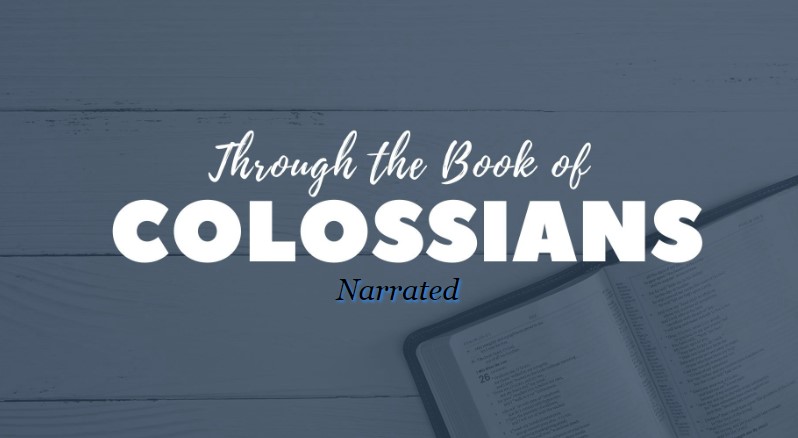
Abiding
Faith with Humility: When Love Replaces Judgment [podcast]

“For in Jesus Christ neither circumcision availeth any thing, nor uncircumcision; but faith which worketh by love.” Galatians 5:6
Recently I ran across a sobering title for a video by a pastor. It read:
“They have the gospel backwards: Why are Christians so mean?”
Have you memorized Matthew 5:44 in the King James Bible?
“But I say unto you, Love your enemies, bless them that curse you, do good to them that hate you, and pray for them which despitefully use you, and persecute you;” Matthew 5:44
“Love worketh no ill to his neighbour: therefore love is the fulfilling of the law.” Romans 13:10
“For he shall have judgment without mercy, that hath shewed no mercy; and mercy rejoiceth against judgment.” James 2:13
“And above all these things put on charity, which is the bond of perfectness.” Colossians 3:14
“Though I speak with the tongues of men and of angels, and have not charity, I am become as sounding brass, or a tinkling cymbal. 2 And though I have the gift of prophecy, and understand all mysteries, and all knowledge; and though I have all faith, so that I could remove mountains, and have not charity, I am nothing. 3 And though I bestow all my goods to feed the poor, and though I give my body to be burned, and have not charity, it profiteth me nothing.
4 Charity suffereth long, and is kind; charity envieth not; charity vaunteth not itself, is not puffed up, 5 doth not behave itself unseemly, seeketh not her own, is not easily provoked, thinketh no evil; 6 rejoiceth not in iniquity, but rejoiceth in the truth; 7 beareth all things, believeth all things, hopeth all things, endureth all things.
8 Charity never faileth: but whether there be prophecies, they shall fail; whether there be tongues, they shall cease; whether there be knowledge, it shall vanish away.” 1 Corinthians 13:1-8
Let’s Grow Together! Sign up here to begin receiving the Moments with Our Master email devotional that is sure to help you grow in His grace and in the knowledge of our LORD and Savior Jesus Christ (2 Pet. 1:2; 3:18). It’s sent out for the edification of the body of Christ. Sign Up HERE.
Support | STORE | Podcasts | Jail/Prison Ministry | Mexico Mission here | All Ministry Updates | More on Assurance here | Because You Care Page | The Greatest of these is Charity | Be Ready in the Morning [podcast] | The Sure Mercies of David [podcast] | That Repentance and Remission of Sins should be Preached [podcast] | At His Feet | Knowing God | The Cross Life | 100’s of Christ-centered Scripture-rich Podcasts | Christology = the Study of Christ


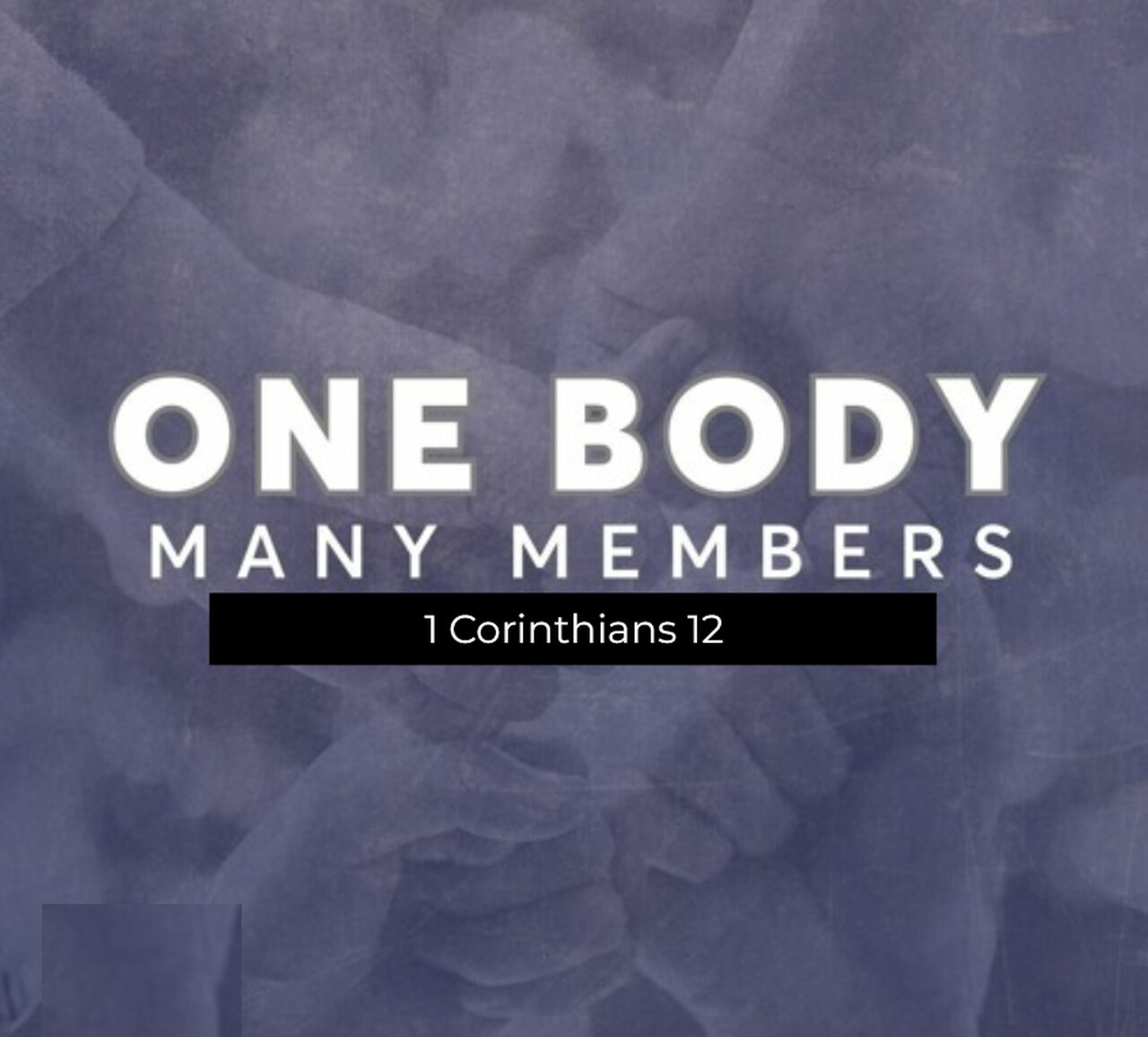

 America11 months ago
America11 months agoThe Drugging of America: The Pharmakeia Sorcery Deception [podcast]

 Articles2 years ago
Articles2 years agoChildren being Rescued in Tunnels: Happening Now – UPDATE!

 Articles8 years ago
Articles8 years agoSelf-Examination in Preparation for the Lord’s Return

 Apostasy2 years ago
Apostasy2 years agoSHOCKING List of False Prophets Most Believe are True











